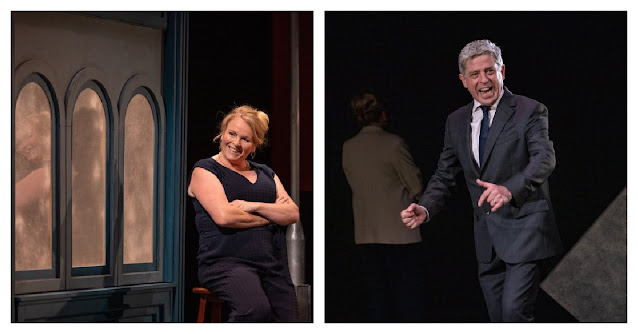Teenagers in Love is playing at the intimate The Chain Theater in midtown. It is a surprisingly big play in the space. The emotions displayed by the talented cast are alternately exuberant and restrained, often filling the space and other times drawing us into the tight and ridged confines both physically and mentally.
Teenagers in Love is the story of Harp and Becca, teenagers then and adults now. As teenagers about to graduate from High School in New Jersey they were open free and wild – ready for the adventure of adult life. As adults, Harp and Becca are tentative, reaching out to rediscover the past and each other after 45 years of estrangement.
The play opens with Harp and Becca (Wayne Maugans and Renata Hinrichs) sitting uncomfortably at Harp’s plain table. Both the house and Harp are run down and tired. Becca is unsettled by the changes and trajectory that Harp’s life has taken. Becca is a nice middle-class woman who can’t explain her anxiety despite the obvious waves of anger, sadness, and fondness.
 |
| Renata Hinrichs, Ziggy Schulting, Jack Rasmussen, Wayne Maugans (photo: Ross Roland) |
Their meandering banter and thoughts of their lost youth dissolve into the story of their graduation night.
We are transported back to 1971 in the local bar where Harp and Becca (here Jack Rasmussen and Ziggy Schulting) bask in the warmth of friends and freedom from school. The group of friends include a young Black man, Ben (Jacobi Hall), Ben’s girlfriend Bonnie (Kaitlyn Mitchell) and occasionally Becca’s brother Donnie (Alexander Chilton). Together they laugh, drink, boast, sing, and drink, all watched over by Gladys (Jackie Maruschak) the mother hen bartender. Gladys has seen this before. Every year students graduate, promising to stay friends and come back to visit. But Gladys knows the truth, lacing a tinge of melancholy over the proceedings. They might come back for holidays every two or three years before disappearing into their new lives. But here and now, in 1971 Harp and Becca are loudly in love. Harp and Ben’s friendship is deep, and life spreads out before them all like an all you can eat buffet.
 |
| Teenagers in Love Cast (photo: Ross Roland) |
Returning to the present, Harp and Becca bond over the past they thought they forgot, but it comes back in fits and starts. Not just the intimacy and love, but pain as well. On that night in 1971, Becca’s brother Donnie died, falling off a cliff in the Palisades.
Harp was arrest for pushing and killing Donnie. Although Harp was acquitted of the crime, Becca still has doubts. She has returned to this place to let Harp know that new tests have been created to check Donnie’s hoodie for blood, and Harp’s blood was found. Becca wants to warn Harp that he would be subpoenaed soon to give testimony. Harp’s emotions run from sadness to anger. He was already acquitted 46 years ago, why now?
The story of Teenagers in Love is the story solving that night. Understanding the forces that swept them apart and led them into such different paths. Both Harp and Ben had scholarships to good schools, Becca had plans for Rutgers and beyond, but it seems nothing worked out as planned. Death, anger, and pain are too strong to be stopped, only delayed.
Sean O’Connor wrote Teenagers in Love pulling from his own remembrances of being young and in love with life. The power of those emotions is seductive in the play, touching our memories as well. Director Debra Whitfield does great work in keeping the story at the front through changes in setting, time, and tone. She and the cast make the transitions effortless and lets the actors work shine effortlessly.
Teenagers in Love is not a perfect play. There are many moving parts and one or two don’t always fit exactly rightr. But small missteps do not detract from the great acting, the transport back to the 1970s and the feelings of nostalgia and warmth which that acting brings to us. The player share with the audience that warmth and humor of their stories, tempered by sadness at the roads not taken.




























